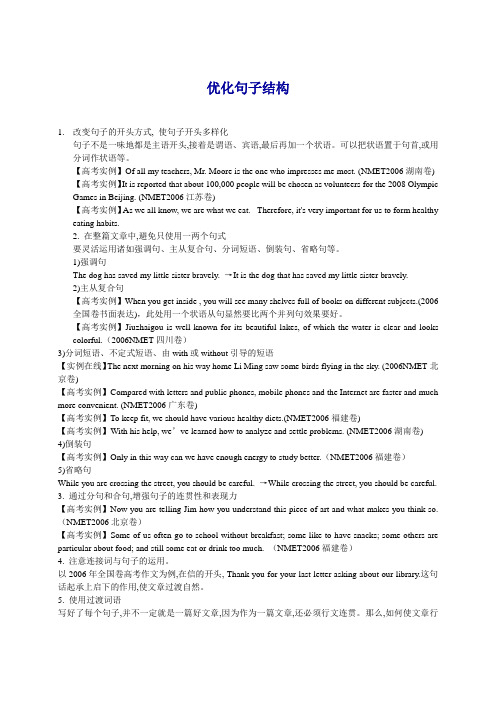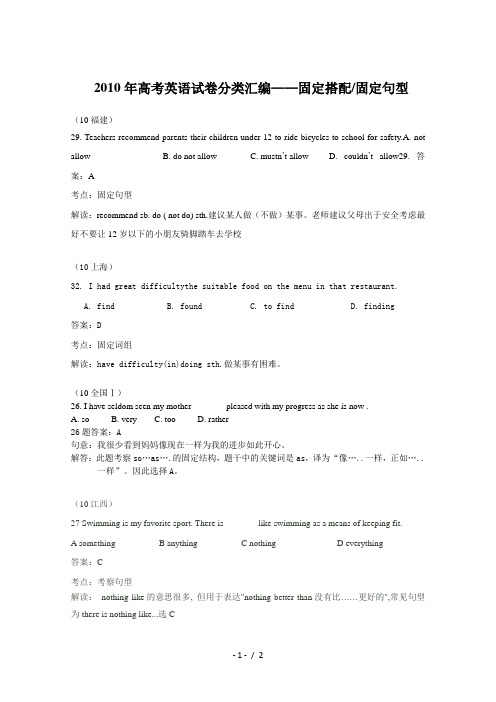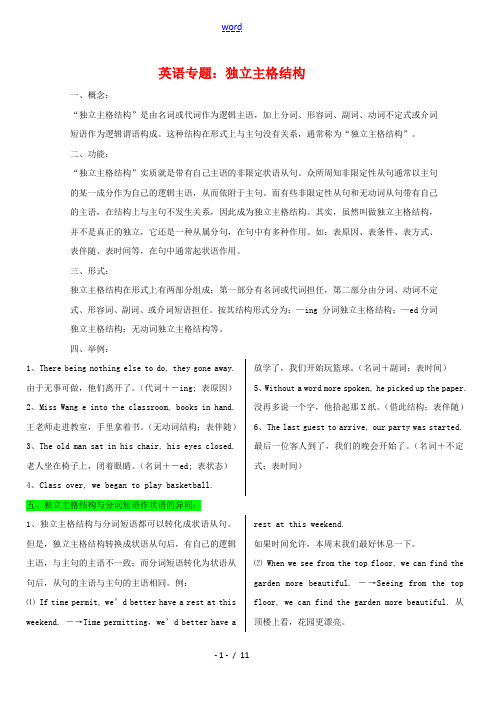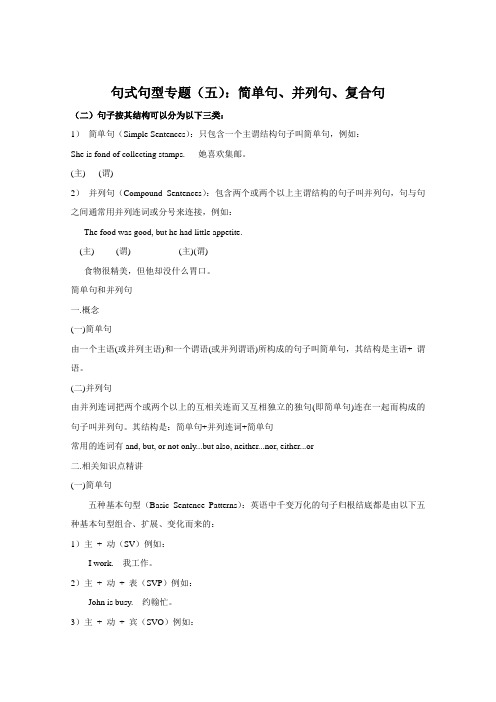2010届高考二轮复习句式结构三十六套(英语)
2010高三英语备考素材作文篇——优化句子结构.

优化句子结构1.改变句子的开头方式, 使句子开头多样化句子不是一味地都是主语开头,接着是谓语、宾语,最后再加一个状语。
可以把状语置于句首,或用分词作状语等。
【高考实例】Of all my teachers, Mr. Moore is the one who impresses me most. (NMET2006湖南卷) 【高考实例】It is reported that about 100,000 people will be chosen as volunteers for the 2008 Olympic Games in Beijing. (NMET2006江苏卷)【高考实例】As we all know, we are what we eat. Therefore, it's very important for us to form healthy eating habits.2. 在整篇文章中,避免只使用一两个句式要灵活运用诸如强调句、主从复合句、分词短语、倒装句、省略句等。
1)强调句The dog has saved my little sister bravely. →It is the dog that has saved my little sister bravely.2)主从复合句【高考实例】When you get inside , you will see many shelves full of books on different subjects.(2006全国卷书面表达),此处用一个状语从句显然要比两个并列句效果要好。
【高考实例】Jiuzhaigou is well known for its beautiful lakes, of which the water is clear and looks colorful.(2006NMET四川卷)3)分词短语、不定式短语、由with或without引导的短语【实例在线】The next morning on his way home Li Ming saw some birds flying in the sky. (2006NMET北京卷)【高考实例】Compared with letters and public phones, mobile phones and the Internet are faster and much more convenient. (NMET2006广东卷)【高考实例】To keep fit, we should have various healthy diets.(NMET2006福建卷)【高考实例】With his help, we’ve learned how to analyze and settle problems. (NMET2006湖南卷) 4)倒装句【高考实例】Only in this way can we have enough energy to study better.(NMET2006福建卷)5)省略句While you are crossing the street, you should be careful. →While crossing the street, you should be careful.3. 通过分句和合句,增强句子的连贯性和表现力【高考实例】Now you are telling Jim how you understand this piece of art and what makes you think so.(NMET2006北京卷)【高考实例】Some of us often go to school without breakfast; some like to have snacks; some others are particular about food; and still some eat or drink too much. (NMET2006福建卷)4. 注意连接词与句子的运用。
2010年高考英语试题分类汇编固定搭配固定句型

2010年高考英语试卷分类汇编——固定搭配/固定句型(10福建)29. Teachers recommend parents their children under 12 to ride bicycles to school for safety.A. not allow B. do not allow C. mustn’t allow D. couldn’t allow29. 答案:A考点:固定句型解读:recommend sb. do ( not do) sth.建议某人做(不做)某事。
老师建议父母出于安全考虑最好不要让12岁以下的小朋友骑脚踏车去学校(10上海)32. I had great difficultythe suitable food on the menu in that restaurant.A. findB. foundC. to findD. finding答案:D考点:固定词组解读:have difficulty(in)doing sth.做某事有困难。
(10全国Ⅰ)26. I have seldom seen my mother _______ pleased with my progress as she is now .A. soB. veryC. tooD. rather26题答案:A句意:我很少看到妈妈像现在一样为我的进步如此开心。
解答:此题考察so…as….的固定结构,题干中的关键词是as,译为“像…..一样,正如…..一样”。
因此选择A。
(10江西)27 Swimming is my favorite sport. There is _______ like swimming as a means of keeping fit.A somethingB anythingC nothingD everything答案:C考点:考察句型解读:nothing like的意思很多, 但用于表达"nothing better than没有比……更好的",常见句型为there is nothing like...选C(10陕西)18. It never occurred to me _____ you could succeed in persuading him to change his mind.A. whichB.whatC.thatD. ifC.【解读】考查固定句型。
2010年高三英语高考复习专题:独立主格结构

word英语专题:独立主格结构一、概念:“独立主格结构”是由名词或代词作为逻辑主语,加上分词、形容词、副词、动词不定式或介词短语作为逻辑谓语构成。
这种结构在形式上与主句没有关系,通常称为“独立主格结构”。
二、功能:“独立主格结构”实质就是带有自己主语的非限定状语从句。
众所周知非限定性从句通常以主句的某一成分作为自己的逻辑主语,从而依附于主句。
而有些非限定性从句和无动词从句带有自己的主语,在结构上与主句不发生关系,因此成为独立主格结构。
其实,虽然叫做独立主格结构,并不是真正的独立,它还是一种从属分句,在句中有多种作用。
如:表原因、表条件、表方式、表伴随、表时间等,在句中通常起状语作用。
三、形式:独立主格结构在形式上有两部分组成:第一部分有名词或代词担任,第二部分由分词、动词不定式、形容词、副词、或介词短语担任。
按其结构形式分为:—ing 分词独立主格结构;—ed分词独立主格结构;无动词独立主格结构等。
四、举例:1、There being nothing else to do, they gone away. 由于无事可做,他们离开了。
(代词+-ing; 表原因)2、Miss Wang e into the classroom, books in hand. 王老师走进教室,手里拿着书。
(无动词结构;表伴随)3、The old man sat in his chair, his eyes closed. 老人坐在椅子上,闭着眼睛。
(名词+-ed; 表状态)4、Class over, we began to play basketball. 放学了,我们开始玩篮球。
(名词+副词;表时间)5、Without a word more spoken, he picked up the paper. 没再多说一个字,他拾起那X纸。
(借此结构;表伴随)6、The last guest to arrive, our party was started. 最后一位客人到了,我们的晚会开始了。
2010届高考英语复习测试题36

2010届高考英语复习测试题36 2010届高三英语复习题:Unit 23 The find of the century 习题精选 一、单项选择 1. ________ she was reading _______ she fell asleep. A. One moment, and now B. One minute, and then C. A moment, till now D. A minute, and at present 2. You’d better ________ your aud ience when you are speaking. A. turn on B. turn off C. turn to D. turn up 3. I ________ in Guangzhou for six years by this October. A. have lived B. was living C. will be living D. shall have lived 4. She ________ a teacher for thirty years and ________ in our school. A. has become, has taught B. has been, have taught C. has been, has been teaching D. has become, has been teaching 5. I turned the comer and looked _________. A. in astonished B. in astonishment C. to my astonishment D. astonishing 6. The lecture soon got us ________. A. think B. to think C. thinking D. thought 7. Aunt Wu came in, ________ by her daughter. A. followed B. following C. to follow D. follow 8. ________ you don't lose heart, you'll find the way out. A. So long as B. Because C. Unless D. Though 9. _________ possible, we will use parts made in China. A. Unless B. Wherever C. When D. Where 10. ________ you may do, you must do it well. A. What B. Whatever C. Where D. Wherever 11. The kind-hearted woman took good care of the orphan ________ he were her own child. A. like B. at C. as if D. for 12. My sister dislikes singing, ________. A. so do you B. neither do they C. nor like D. so dislike you 13. Autumn coming, down ________. A. do the leaves fall B. the leaves fall C. falling the leaves D. fall the leaves 14. Up into the sky ________. A. went the light blue smoke B. the light smoke went C. go the light blue smoke D. does the light blue smoke go 15. They were lost. They couldn’t find their ________. A. road B. path C. way D. direction 答案:1~5ACDCB 6~10CAABB 11~15CBDAC 二、完形填空 Education is not only the teaching and learning of knowledge, but also the developing of a person’s 1 . Now liberal education has a great effect on the world. Much work has been done to 2 better ways of teaching. Students are 3 to have their own thoughts and their own ideas when they have lessons, which are often held in the form of group discussions. They are properly guided to use the knowledge 4 . In liberal education punishment 5 exists. Teachers and students are just like friends. The idea is of course a perfect one if it can really be carried out. However it only 6 in the imagination and will never be 7 . We must admit that children should 8 be guided properly. Just close your eyes and think how many students 9 in every hundred 10 will carry out the duties of a student if they are not 11 . What is the use of advice only if it is not supported by a 12 degree of control and punishment? It is 13 for us to judge the success and failure of this kind of education now, but from the bad behavior of the children who are actually the result of 14 , we can see that something must be done to 15 these children. 1. A. politeness B. habit C. interests D. character 2. A. master B. find C. make D. hold 3. A. ordered B. encouraged C. used D. driven 4. A. seen B. noticed C. learned D. met 5. A. still B. no longer C. always D. for ever 6. A. goes B.. lives C. comes D. exists 7. A. realized B. supported C. understood D. produced 8. A. at least B. in the end C. ever D. in life 9. A. it is B. it seems C. there are D. are 10. A. which B. that C. he D. they 11. A. pulled B. pushed C. permitted D. protected 12. A. reasonable B. remarkable C. strict D. small 13. A. easy B. hard C. possible D. proper 14. A. liberal education B. group discussion C. education D. teaching 15. A. punish B. excuse C. help D. trust 答案:1~5DBBCA 6~10DACCB 11~15BABCC 三、阅读理解 Education is not an end, but a means to an end. In other words, we do not educate children only for the purpose of educating them. Our purpose is to fit them for life. In some modem countries it has for some time been fashionable(时兴的)to think that by free education for all㎏whether rich or poor, clever or stupid—one can solve all the problems of society and build a perfect nation. But we can already see that free education for all is not enough; we find in such countries a far larger number of people with university degrees, they refused to do what they think “low” work, and, in fact, work with hands is thought to be dirty and shameful in such countries. But we have only to think a moment to understand that the work of a completely uneducated fanner is far more important than that of a professor, we can live without education, but we die if we have no food. If no one cleaned our streets and took the rubbish away from our houses, we should get terrible diseases in our towns. . . In fact, when we say that all of us must be educated to fit us for life, it means that we must be educated in such a way that, firstly, each of us can do whatever work suited to his brains and ability and, secondly, that we can realize that all jobs are necessary to society, and that it is very bad to be ashamed of one’s work. Only such a type of education can be considered valuable to society. 1. The writer of this passage think that ________.
2010届高考英语复习句式句型专题5

句式句型专题(五):简单句、并列句、复合句 (二)句子按其结构可以分为以下三类: 1) 简单句(Simple Sentences):只包含一个主谓结构句子叫简单句,例如: She is fond of collecting stamps. 她喜欢集邮。 (主) (谓) 2) 并列句(Compound Sentences):包含两个或两个以上主谓结构的句子叫并列句,句与句之间通常用并列连词或分号来连接,例如: The food was good, but he had little appetite. (主) (谓) (主)(谓) 食物很精美,但他却没什么胃口。 简单句和并列句 一.概念 (一)简单句 由一个主语(或并列主语)和一个谓语(或并列谓语)所构成的句子叫简单句,其结构是主语+ 谓语。 (二)并列句 由并列连词把两个或两个以上的互相关连而又互相独立的独句(即简单句)连在一起而构成的句子叫并列句。其结构是:简单句+并列连词+简单句 常用的连词有and, but, or not only...but also, neither...nor, either...or 二.相关知识点精讲 (一)简单句 五种基本句型(Basic Sentence Patterns):英语中千变万化的句子归根结底都是由以下五种基本句型组合、扩展、变化而来的: 1)主 + 动(SV)例如: I work. 我工作。 2)主 + 动 + 表(SVP)例如: John is busy. 约翰忙。 3)主 + 动 + 宾(SVO)例如: She studies English. 她学英语。 4)主 + 动 + 宾 + 补(SVOC)例如: Time would prove me right. 时间会证明我是对的。 5)主 + 动 + 间宾 + 直宾(SVOiOd)例如: My mother made me a new dress. 我母亲给我做了一件新衣裳。
2010-2023历年高考二轮复习三月精品练习单项选择53英语试卷(带解析)

2010-2023历年高考二轮复习三月精品练习单项选择53英语试卷(带解析)第1卷一.参考题库(共25题)1.______ by jeep, we visited a number of cities in South China.A.TravelingB.TraveledC.To be travelingD.Having traveled2.The setting sun was reflected on the river, ________ everything along the banks________ all the more beautiful.A.to make; lookB.making; lookingC.making; to lookD.making; look3.—Why didn’t you put your cellphone in your overcoat pocket?—I ________, but I was afraid it would be stolen.A.had putB.putC.would haveD.could have4.Do you remember the day ________ we played all day along the seaside? A.whichB.thatC.whenD.about which5.“I like you more than her, my dear.” “You mean more than _____love her or more than she loves _____?”A.you, meB.she, youC.I, meD.I, you6.They believe that the spirit remains with the body for 3 days;_____ someone always stays with the dead person.A.so during this timeB.during whichC.during which timeD.so when7.Some passengers were ______ in the traffic accident and taken to the nearest hospital. A.injuredB.damagedC.destroyedD.harmed8.I told them not everybody could run as fast as you did, _____?A. could heB. didn’t IC. didn’t youD. could they9.We allow in the woods but anyone is forbidden here.A.to camp; to smokeB.camping; smokingC.to camp; smokingD.camping; to smoke10.—Johnson, there’re a lot of chairs over there. Go and fetch ________ for me.—Why ________ ? Mike is sitting there doing nothing.A.one; meB.that; not heC.it; not himD.some; I11.Just like spoken language, body language from culture to culture,B.variesC.exchangesD.appearsrge quantities of water, as well as some other timely help including a medical team ___since the serious drought hit Yunnan Province.A.has offeredB.had been offeredC.have been offeredD.is offered13.---What is the terrible noise ?----The neighbours________their kitchen.A.have repairedB.are repairingC.repairedD.will repair14.—You seem to show interest in cooking.—What?_________, I’m getting tired of it.A.On the contraryB.To the contraryC.On the other handD.To the other hand15.—_____ that he picked up his uncle at the airport?—It was at 6:00 in the afternoon _____ he got off work.A.Was it when; thatB.When was it; thatC.Was it when; whenD.When was it; when16.The country's railway system has launched online ticket-booking and a real-name ticket purchasing system, and _______ requires passengers to provide their ID numbers when buying tickets.A.whichB.thatC.whatD.this17._______ he was the last man I wanted to see, I did all that I could to help him. A.AsB.Now thatD.As though18.— Shall Mary come to the concert with us?-Not_____she has finished her paper.A.sinceB.onceC.whenD.unless19.We need a (n) ____________ team leader who can really motivate the members to work harder.A.grumpyB.irritableC.dynamicD.fussy20.Lucy is looking for a job ____ can offer her a good salary and ____she can also communicate with a large number of foreignersA.where ,whereB.which, whichC.which ,whereD.where, which21.Many a student _____ that mistake before.A.hasmadeB.havemadeC.hasbeenmadeD.hadmade22.However weak we are, we can still do something against the powerful nature as long as we are ______ prepared.A.speciallyB.physicallyC.adequatelyD.equally23.---- Look! Everything here is under construction.---- Oh, has the building once ___ for exhibition been pulled down, too?A.having been builtB.being builtC.to be builtD.built24.---Hi, Lucy.Have you heard of any good news about Frank recently?---Yeah.She ____ have done better.She has been admitted to one of the top-ten universities in the States.A.shouldn’tB.wouldn’tC.needn’tD.couldn’t25.The European Union universities are _______ most attractive because they have ______ diversity of cultures and teaching methods.A.the , aB.a , aC.a , theD.the , the第1卷参考答案一.参考题库1.参考答案:A试题分析:句意:我们坐吉普车旅行,参观了华南的许多城市。
2010高考二轮复习英语学案专题七情态动词和虚拟语气
★精选文档★2010 高考二轮复习英语教案专题七神态动词和虚构语气2010高考二轮复习英语教案专题七神态动词和虚拟语气【典例精析】1.(2007全国卷II,8)_______hehadnothurthisleg,johnwouldhavewontherace.【分析】 A 有题干可知,“若不是他伤了腿,约翰就能赢得竞赛了”,运用了虚构语气,故用if 。
2.(2008山东卷,24)Thanyouforallyourhardworlastwee.Idon’tthinwe____itwithoutyou.【分析】 B 本题考察神态动词表示虚构意义的用法。
Idon ’ tthin能否认前移。
意为:我以为没有你我们本不能做成这件事的。
本题要点是要依据句意知道是虚构语气,其基本形式是神态动词(过去式)+havedone, 所以其余选项皆可清除。
【答案】 B★精选文档★3 (09 福建) .ButforthehelpofyEnglishteacher,I____thefirstpr izeintheEnglishWritingcopetition.won【答案】 B 虚构语气。
此处虚构语气表示与过去事实相反,句子谓语动词用would/should/could/ight+havedone构造,应选B。
4. (09 湖南)—It ’stheoffice!Soyou_____noweatingisnotallowedhere.— oh,sorry.【分析】 A 句意为:这是办公室!所以你一定知道吃的不一样意带到这里。
ust 表示“绝不”的意思。
5.(09海南)Whatdoyouean,thereareonlytenticets?There_____betwel ve【答案】 A。
你这是什么意思,只有十张票吗?应当有十二人。
should 表示“应当,应当”。
6.(09上海)It_____havebeenTothatparedthecarhere,asheistheonlyo newithacar.【分析】 c 考察神态动词的基本用法。
2010高考二轮复习英语考案专题七情态动词和虚拟语气
2010高考二轮复习英语考案专题七 情态动词和虚拟语气 【专题考案】 1. —That must be a mistake. —No, it _____ a mistake. A. must not be B. needn’t be C. cannot be D. would not be 2. —_____ I water the trees on Tuesday? —No, you needn’t. A. Can B. Must C. May D. Shall 3. He _____ not pay unless he is punished to pay. A. shall B. will C. can D. would 4. I _____ such a mistake again. A. shall never make B. may never make C. can never do D. need never do 5. —_____ I turn on the radio? —You’d better not. It is noisy enough in this room. A. Shall B. Must C. Need D. Do 6. Let’s go to the library this afternoon, _____? A. shall we B. will we C. can we D. should we
7. Where are my keys? I _____ lost them. A. ought to B. should have C. will have D. must have 8. Even if he has time, he _____ shopping in town on Sunday.
A. won’t go B. will go C. won’t go to D. doesn’t go 9. He _____ finished earlier. A. shall have B. ought to C. could have D. must have 10. In case I _____, I would try again. A. will fail B. would miss C. should fail D. shall miss
2010高考二轮复习英语教案——专题八-非谓语动词和独立主格结构
2010高考二轮复习英语教案——专题八-非谓语动词和独立主格结构D定语、状语、表语等;掌握非谓语动词充当相同句子成分时的辨析;掌握非谓语动词在不同的语境、语义下的运用。
对于独立主格结构考纲要求掌握独立主格结构的构成方式;在句子中的作用以及with复合结构。
【教法指引】非谓语动词包括不定式、v-ing形式和过去分词,是高中英语学习的难点,也是高考考查的重点。
高中英语非谓语动词是一个重要考点,教师在引导学生复习备考中要注意重点突出、训练得当,尤其是对以下要点的复习:1.不定式、现在分词与过去分词的用法区别;2.非谓语动词的主动式与被动式;3.非谓语动词完成式的用法;4.非谓语动词用作伴随状语;5.非谓语动词用作目的状语;6.非谓语动词用作结果状语;7.非谓语动词用作宾语补足语;8.非谓语动词的逻辑主语问题;9.非谓语动词用作主语的问题;10.“(be+)过去分词+介词”结构;11.动名词的复合结构和there be结构的非谓语动词形式。
对于独立主格结构的复习,教师必须要讲清它的构成方式和在句子中的作用以及与with复合结构和分词之间的辨析的关系。
【知识网络】非谓语动词用法非谓语动词主要包括不定式、动名词和现在分词。
为了区分这三种不同的非谓语动词的用法和含义,我们将分别从三种非谓语动词在句子中做主语、宾语、宾语补足语、定语、状语、表语以及一些特殊结构句型等角度来区分其用法和细微含义。
1.不定式和动名词作主语的区别(1)动名词作主语通常表示抽象动作;而不定式作主语表示具体动作。
Smoz.x.x.kld一词,其后宾语只跟不定式,不能跟动名词。
例如:I should liz.x.x.kch, a lot 等习惯上用不定式做定语。
John will do anything but worz.x.x.kt shutting the door behind him.他出去后将门随手关上。
Not z.x.x.kt a word more spoken, he picked up the paper.没再多说一个字,他拾起那张纸。
- 1、下载文档前请自行甄别文档内容的完整性,平台不提供额外的编辑、内容补充、找答案等附加服务。
- 2、"仅部分预览"的文档,不可在线预览部分如存在完整性等问题,可反馈申请退款(可完整预览的文档不适用该条件!)。
- 3、如文档侵犯您的权益,请联系客服反馈,我们会尽快为您处理(人工客服工作时间:9:00-18:30)。
本资料来源于大家网高考英语论坛http://club.topsage.com/forum-136-1.html 更多精品尽在大家网 http://www.TopSage.com/ 2010届高考二轮复习句式结构三十六套 1.It is/was + 被强调部分 + that / who… Who / What / When / Where / How / Why…is / was + it + that …?
2.It is/was + adj./n./P.P..+ that / what / who / whom / whether / when / where / why…
3.It is / was adj. + for sb. to do… 4.It is / was + adj.( good / kind / nice / wise / clever / silly / stupid / foolish / right / wrong / rude / polite / impolite / careful / careless…) + of sb. to do…
5.It is time ( for sb.) to do sth…/for sth到了该做…的时候 It is (high) time (that) + 主语 + 过去式…早该做…还没做…
6.It is + three years… + since + 主语 + did 自从…有多久了 It was + three years… + since + 主语 + had done
7.It is / was / will be…(not) long + before…过…多久才, 不久就… It is / was not until…that…
8.vt.--- think / find / suppose / believe…+ it + adj./n. + to do / doing / that… 9.条件分句 (祈使句 / 短语) ,+ and / then / or + 结果分句 (将来时) 10. There be / lie / stand / exist / live / come / follow / flow / enter / remain…+ 主语 … There is/was + no use / good + doing…
There is/was + no need to do…/for sth. 11.used to do / be… be / get used to doing… / sth. be used to do…/ for sth
12.The + 比较级 + 主语 + 谓语…, the + 比较级 + 主语 + 谓语… 比较级 + and + 比较级
13.twice / three times / 60% / two thirds…+ 比较级 + than…/ as + 原级 + as… 14.would rather (not) do …than do would rather + 主语 + 过去式…
would like/love (sb.) + to do… 本资料来源于大家网高考英语论坛http://club.topsage.com/forum-136-1.html 更多精品尽在大家网 http://www.TopSage.com/ Would you mind doing…/if….? (not) feel like doing / sth. prefer to do…rather than + do…. prefer doing…/ sth….to doing…/sth.
15.have been / have gone have sth./sb. + done / doing / do… have sth./sb. + to do / to be done…
with + sb./sth + to do / doing / done/ prep.短语/ adj./ adv.… 16.vt.---mind / enjoy / finish / practise / admit / appreciate / avoid / escape / suggest / delay / imagine / face / keep / forgive / excuse / miss / prevent / risk / understand / stand / be worth / be busy…+ doing…
17.vt.--- aim / attempt / choose / want / wish / hope / agree / promise / decide /determine / manage / fail / pretend / prepare / prove /refuse / expect / tend / wish / wait / offer… + to do…
18.Prep “to”---lead to / refer to / stick to / owe to / thanks to / due to / belong to/connect to / join to/ compare to / according to / get down to / devote to/ object to / look forward to / pay attention to / be used to…
19. vt.---let / make / have / see / hear / watch / listen to / look at / notice / observe ...+ sb./ sth. + do…( 被动式 to do…) / doing… / done
20.remember to do… forget to do… doing… doing… mean to do… try to do… doing doing regret to do… doing stop to do go on to do… doing doing…
21. vt.--- need / want / require… + doing … / to be done 22.部分倒装--- No / Not / Never / Neither / Nor / Hardly / Seldom / Only / Such / Scarcely / Rarely / Nowhere / Not until / At no time / On no account / In no way / by no means / No longer / No more / No sooner / No less / So…+ 助动词 +主语 +V… 本资料来源于大家网高考英语论坛http://club.topsage.com/forum-136-1.html 更多精品尽在大家网 http://www.TopSage.com/ . Hardly + 倒装式 had + 主语 + done …when…did… No sooner + 倒装式 had + 主语 + done + than…did… Not until…+ 主句倒装式 did + 主语 + do… It is / was not until…that… 全部倒装---There / Here / Then / Now / Up / Down / In / Out / Such … + 谓语 + 主语…
23.So + 主语 + be / have / can / do。。。 “的确…” So + be / have / can/ do…+ 主语 “也…” So it is / was with… . Nor / Neither + be / have / can / do…+ 主语“也不…” 24….was / were doing / about to do / on the point of / had just done …when… 25.when / while / if / once / as if / even if / though / as / until / whether / unless / where… (省略主语+ be) , + 主句
26. no matter + what / how / who / whom / whose / which / whether /where / when… + 主句(只用于让步状语从句,不可用于名词性从句
----whatever/however/whoever/whichever/wherever/whenever….)无论什么….
27.vt---demand / insist / suggest / command / order / request…that + 主语 + (should) + do / be / be done. n---demand / insistence / suggestion / command / order / request…that + 主语 + (should) + do / be / be done.
28.can, can’t, may, must, mustn’t, will, would, shill, should, ought to, need, dare, must + have done may / might + have done can / could (not) + have done should / ought to + have done need + have done 29. What + a / an / the + adj.+ n. + (主语 + 谓语) ! How + adj. / adv. + (主语 + 谓语) !
30. What / How about (doing) sth.? How do you like / find / feel…? What do you think of / about…? How … deal with…? What … do with…? How are you getting on / along with…? How is / are…?
